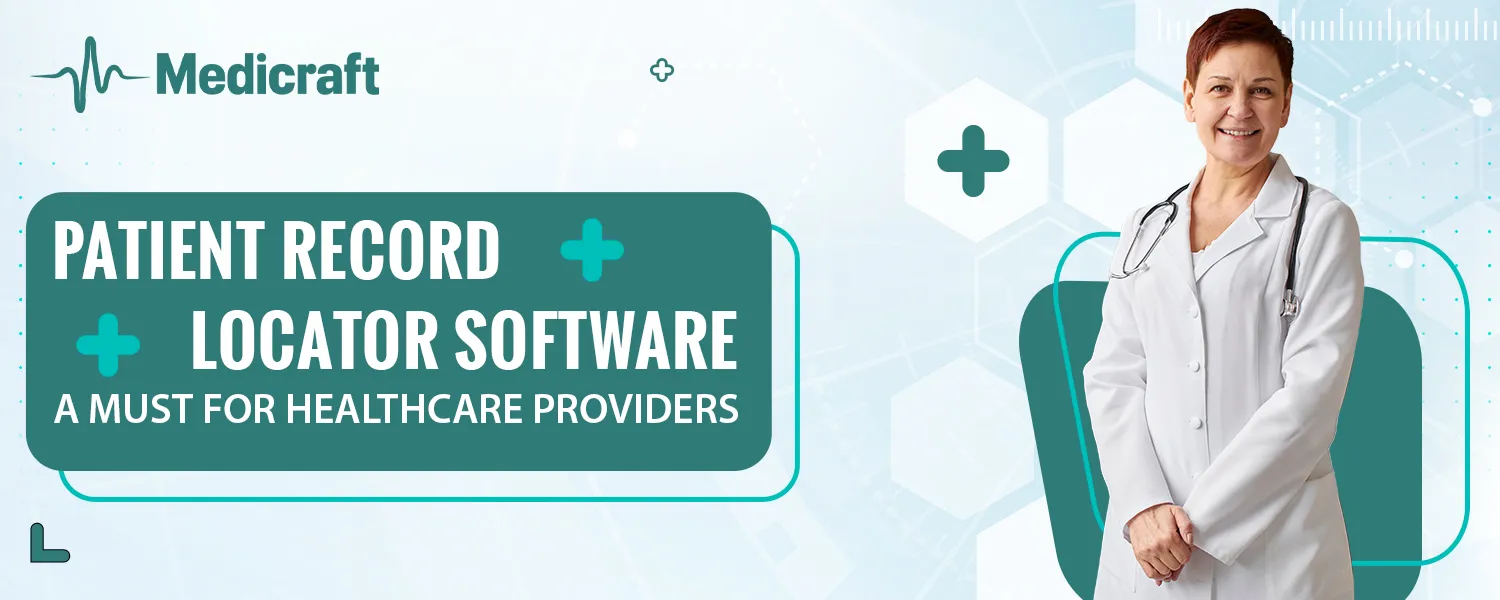According to statistics, hospitals generate more than 100 terabytes of data per day. However, there is a problem: the data are mostly unstructured (spread across multiple systems, documents, and in different formats), making it hard for healthcare providers to understand.
For example, if a patient visits a hospital where each department maintains its own separate database, having access to their complete medical history can be impossible. This is because their doctor needs to go through several databases and files before they see the information they want. Such a process takes a lot of time and can also lead to human error, causing inadequate patient care.
To avoid all that, healthcare providers need to invest in medical billing software to manage their patient data. In this blog, Medicraft explains everything you need to know about patient record locator software, including the features that show it is the best system for your practice.
What Is Patient Record Locator Software?
Patient record locator software is a health information management tool that helps healthcare providers find and manage patient medical records across different databases and healthcare systems. Instead of looking through different files manually or a small data storage, the software provides a centralized dashboard that shows where each patient’s records are located.
Why is Patient Record Locator Software Important?
A record locator simplifies the process of retrieving patient data while ensuring interoperability among healthcare providers. For instance, when doctors need a complete view of a patient’s history, the software provides records from every system in the hospital where the patient's treatment journey is documented.
Examples of some of the systems integrating record locators include the following:
- Electronic Health Record Locator Systems: These tools help healthcare providers and hospitals to instantly find where a patient’s health records are stored, even if the patient has received treatment from multiple specialists.
- Hospital and Clinic Databases: It is a system that helps hospitals and clinics store and track their patient records.
- Interoperability Networks: It is a system that is backed by the government to ensure patient data can be moved freely and accurately across different organizations, even if they use different electronic health records (EHR) systems.
Key Features of a Patient Record Locator Software
Below are the important features of patient record locator software that you need to know:
Interoperability Abilities
The software enables the retrieval of a complete patient history, recorded across the hospital system, within seconds. This ensures providers do not waste time before properly diagnosing their patients and providing the right treatment journey.
Data Tracking and Accuracy
The software ensures data is well-structured by eliminating duplicate entries while updating patient records in real-time. This makes patient medical records the same across all systems, reducing the risk of clinical error.
Security and Compliance
The software follows strict regulations and complies with all industrial standards, such as HIPAA, to protect patient privacy.
Scalability
As your practice grows, the software is able to handle increasing databases and new integrations without compromising performance.
The Benefits of Using Patient Record Locator Software
Let's look at some of the benefits of using patient record locator software:
Better Patient Care
When a healthcare provider has access to the complete medical history of their patients. The result: accurate diagnosis and treatment, reducing the chances of prescribing the wrong medication and repeating tests. It also helps them make decisions quickly, especially during emergencies, keeping patients safer throughout their treatment journey.
Efficient Patient Data Management
Obtaining patient records manually often takes so much time and is prone to human error. Patient record locator software, on the other hand, provides patients' complete history within seconds. This process is well structured and makes the work of both healthcare providers and their administrative staff easier.
Easy Medical Billing Process
Incorporating a record locator in the medical billing process ensures healthcare providers bill every service correctly. It helps medical billers identify errors such as missing patient information, thereby avoiding delays.
Industrial Compliance and Interoperability
The healthcare industry is completely regulated by regulations such as HIPAA, which gives guidelines about protecting patient data. Patient record locator software allows secure transfer of data across systems in the healthcare industry while complying with all laws.
Saves Time and Reduces Cost
With patient record locator software, providers are able to reduce their administrative workloads and lower operational costs. It also ensures medical billing is accurate, reducing claim denials, which leads to constant cash flow and revenue growth.
How to Choose the Right Patient Record Locator Software
With many options available, selecting the right software for your practice can feel like a lot of work. Use these five questions to guide your decision-making process:
- What are your needs?
Think about why your practice needs the software. Do you just want to help improve your medical billing processes or patient records management? - Does the software have interoperability features?
Choose software that can integrate with your existing systems, such as EHRs and other health information management tools, to ensure error-free data transfer. - Is it user-friendly?
The software must be easy to understand and use so that your administrative staff can operate it without constant training. - Does it have data security features?
The software should meet industry standards for data security and compliance. - Does the company provide support and training?
Does the company have a dedicated support team and training resources for its clients whenever they need them?






